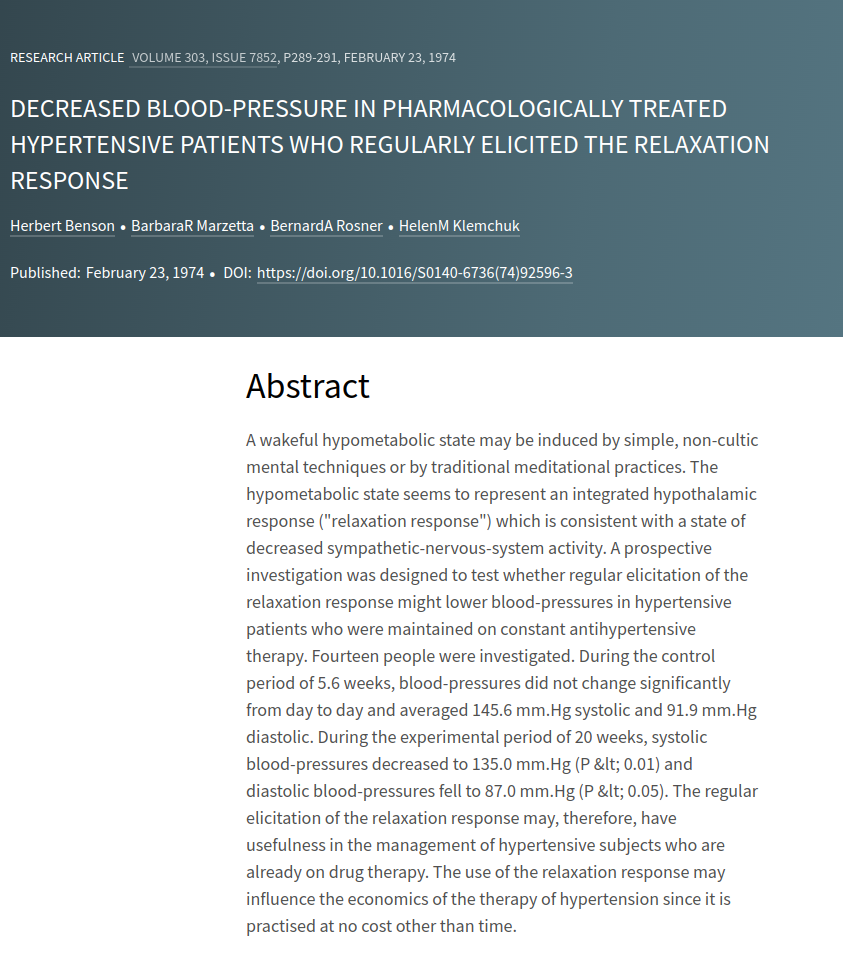A wakeful hypometabolic state may be induced by simple, non-cultic mental techniques or by traditional meditational practices. The hypometabolic state seems to represent an integrated hypothalamic response (“relaxation response”) which is consistent with a state of decreased sympathetic-nervous-system activity. A prospective investigation was designed to test whether regular elicitation of the relaxation response might lower blood-pressures in hypertensive patients who were maintained on constant antihypertensive therapy. Fourteen people were investigated. During the control period of 5.6 weeks, blood-pressures did not change significantly from day to day and averaged 145.6 mm.Hg systolic and 91.9 mm.Hg diastolic. During the experimental period of 20 weeks, systolic blood-pressures decreased to 135.0 mm.Hg (P < 0.01) and diastolic blood-pressures fell to 87.0 mm.Hg (P < 0.05). The regular elicitation of the relaxation response may, therefore, have usefulness in the management of hypertensive subjects who are already on drug therapy. The use of the relaxation response may influence the economics of the therapy of hypertension since it is practised at no cost other than time.
Decreased Blood-Pressure in Pharmacologically Treated Hypertensive Patients Who Regularly Elicited the Relaxation Response
Publication
The Lancet
Volume 303, Issue 7852, P289-291
Abstract
Web and Email Links
Related Listings
Journal
Radiology
Immediately before they underwent femoral angiography, 45 patients were given one of three types of audiotapes: a relaxation response tape recorded for this study, a tape of contemporary instrumental music, or a blank tape. All patients were instructed to listen to their audiotape during the entire angiographic procedure. Each audiotape was played through earphones. Radiologists were not told the group assignment or tape contents. The patients given the audiotape with instructions to […]
Journal
Obstet Gynecol
During a 5-month study, we examined the effects of the relaxation response on premenstrual syndrome in 46 women who were randomly assigned to one of three groups: a charting group, a reading group, and a relaxation response group. The relaxation response group showed significantly greater improvement than the charting and the reading groups on physical symptoms (P less than .025 for both comparisons). There was a significant group-by-severity effect for charting versus relaxation resp […]
Journal
The Lancet
To determine whether decreased sympathetic-nervous-system activity achieved by the relaxation response could decrease premature ventricular contractions (P.V.C.S), eleven ambulatory patients with proven, stable ischæmic heart-disease and P.V.C.s were investigated. The patients, who were taking no medication for the P.V.C.S, were trained to elicit regularly the relaxation response through a non-cultic psychological technique. The frequency of the P.V.C.s was measured by computer analys […]

